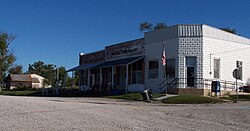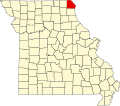Revere, Missouri
Revere, Missouri | |
|---|---|
 Location of Revere, Missouri | |
| Coordinates: 40°29′40″N 91°40′35″W / 40.49444°N 91.67639°W | |
| Country | United States |
| State | Missouri |
| County | Clark |
| Area | |
• Total | 0.19 sq mi (0.48 km2) |
| • Land | 0.19 sq mi (0.48 km2) |
| • Water | 0.00 sq mi (0.00 km2) |
| Elevation | 682 ft (208 m) |
| Population (2020) | |
• Total | 76 |
| • Density | 408.60/sq mi (157.97/km2) |
| Time zone | UTC-6 (Central (CST)) |
| • Summer (DST) | UTC-5 (CDT) |
| ZIP code | 63465 |
| Area code | 660 |
| FIPS code | 29-61292[3] |
| GNIS feature ID | 2396874[2] |
Revere is a city[4] in Clark County, Missouri, United States. As of the 2020 census, its population was 76.[5] It is part of the Fort Madison–Keokuk, IA-MO Micropolitan Statistical Area.
Geography
[edit]Revere is located in northern Clark County three miles from the Missouri-Iowa state line.[6] The Atchison, Topeka and Santa Fe Railroad passes through the community.[7]
According to the United States Census Bureau, the city has a total area of 0.19 square miles (0.49 km2), all land.[8]
History
[edit]Founded on October 22, 1887, by the Santa Fe Railroad, Revere was "probably named in honor of Paul Revere."[9] During the period prior to 1900, Revere flourished as an intermediate stop for the railroad.[10] In 1898, Revere was incorporated as a city in the 4th class of Missouri.[4]

In 1898, J. H. Talbott of Luray started the Revere Weekly Current,[11] a weekly newspaper that consisted of five pages of world and local news including advertisements, train schedules and local markets. Circulation closed on July 18, 1901, when Talbott left for law school.
Located at the former site of the Revere Methodist Church, Ar-Del Park was dedicated on May 30, 1946, as a memorial to Revere natives John Arnold Wallace and Delmar Brown, who died serving their country during World War II.[12] A large boulder with a plaque dedicated to all Clark County veterans is located in the park.
On July 26, 2011, the United States Postal Service announced plans to consider closing the Revere post office as part of a nationwide restructuring plan.[13] On May 9, 2012, it was announced that a new strategy would preserve the nation's smallest post offices, reversing the earlier plan.[14]
Demographics
[edit]| Census | Pop. | Note | %± |
|---|---|---|---|
| 1900 | 161 | — | |
| 1910 | 196 | 21.7% | |
| 1920 | 187 | −4.6% | |
| 1930 | 182 | −2.7% | |
| 1940 | 191 | 4.9% | |
| 1950 | 180 | −5.8% | |
| 1960 | 190 | 5.6% | |
| 1970 | 184 | −3.2% | |
| 1980 | 191 | 3.8% | |
| 1990 | 133 | −30.4% | |
| 2000 | 121 | −9.0% | |
| 2010 | 79 | −34.7% | |
| 2020 | 76 | −3.8% | |
| Decennial US Census | |||
2010 census
[edit]As of the census[3] of 2010, there were 79 people, 36 households, and 24 families residing in the city. The population density was 415.8 inhabitants per square mile (160.5/km2). There were 41 housing units at an average density of 215.8 per square mile (83.3/km2). The racial makeup of the city was 98.7% White, 1.3% from other races. Hispanic or Latino of any race were 1.3% of the population.
There were 36 households, of which 16.7% had children under the age of 18 living with them, 58.3% were married couples living together, 5.6% had a female householder with no husband present, and 33.3% were non-families. 33.3% of all households were made up of individuals, and 2.8% had someone living alone who was 65 years of age or older. The average household size was 2.19 and the average family size was 2.71.
In the city, the population was spread out, with 21.5% under the age of 20, 2.5% from 20 to 24, 19.0% from 25 to 44, 43.0% from 45 to 64, and 13.9% who were 65 years of age or older. The median age was 49 years. For every 100 females, there were 113.5 males. For every 100 females age 18 and over, there were 106.5 males.
Transportation
[edit]Amtrak’s Southwest Chief, which operates between Los Angeles and Chicago, passes through the town on BNSF tracks, but makes no stop. The nearest station is located in Fort Madison, 33 miles (53 km) to the northeast.
Education
[edit]

Revere High School[15] was started in 1923 with a single student, Lula Riley. In 1925, a new building was dedicated for grades K–12. In 1988, the graduating class had two students. After several years of declining enrollment the final high school class graduated in 2002 with five students. The building was then used for K–8 students, with grades 9–12 attending Clark County R-1 high school in Kahoka. Continued declining enrollment led to a vote in April 2012 that resulted in the decision to close the school and annex it to the Clark County R-1 school district effective July 1, 2012.[16]
Despite having one of the smallest high school enrollments in the state of Missouri, the purple and white Bulldogs fielded four Missouri State High School Athletic Association state-qualifying teams. Baseball teams from 1977, 1981 and 1982 and the 1997 girls' basketball team reached the state playoffs.[17]
References
[edit]- ^ "ArcGIS REST Services Directory". United States Census Bureau. Retrieved August 28, 2022.
- ^ a b U.S. Geological Survey Geographic Names Information System: Revere, Missouri
- ^ a b "U.S. Census website". United States Census Bureau. Retrieved January 31, 2008.
- ^ a b "2021-2022 Missouri Roster" (PDF). Missouri Secretary of State. Archived (PDF) from the original on May 12, 2021. Retrieved November 20, 2021.
- ^ "2020: DEC Redistricting Data (PL 94-171)". United States Census Bureau. Retrieved November 17, 2021.
- ^ Missouri Atlas & Gazetteer, DeLorme, First edition, 1998, p. 17 ISBN 0899332242
- ^ Kahoka, MO, 7.5 Minute Topographic Quadrangle, USGS, 1950
- ^ "US Gazetteer files 2010". United States Census Bureau. Archived from the original on January 25, 2012. Retrieved July 8, 2012.
- ^ du Gard, René Coulet; du Gard, Dominique Coulet (1974). The handbook of French place names in the U.S.A., p. 133. Onomastica, Issue 51. Editions des Deux Mondes
- ^ Higgins, Charles A. (1894). New guide to the Pacific coast: Santa Fé route. California, Arizona, New Mexico, Colorado, Kansas, Missouri, Iowa, and Illinois. Rand, McNally
- ^ Revere Weekly Current (Revere, Mo.) 1898–1901, Library of Congress
- ^ MOGEN list of notable persons, Revere's Ar-Del Park Honors Men Killed in WWII.
- ^ "Proposed post office closings". U.S. Postal Service. July 26, 2011. Archived from the original on September 25, 2011. Retrieved July 26, 2011.
- ^ "New Strategy to Preserve Nation's Smallest Post Offices". U.S. Postal Service. May 9, 2012.
- ^ "Revere C-3 School" Retrieved 2010-09-30.
- ^ "A rural school district will become part of history" Retrieved 2023-12-05.
- ^ "Missouri State High School Athletic Association State Championships by Sport" Missouri State High School Athletic Association Retrieved 2023-12-04

